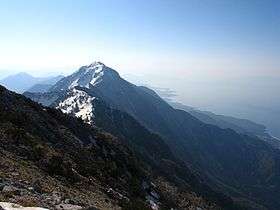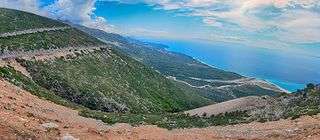Ceraunian Mountains
| Ceraunian Mountains | |
|---|---|
 View from of Maja e Çikës | |
| Highest point | |
| Elevation | 2,045 metres (6,709 ft) |
| Coordinates | 40°11′53″N 19°38′20.27″E / 40.19806°N 19.6389639°ECoordinates: 40°11′53″N 19°38′20.27″E / 40.19806°N 19.6389639°E |
| Geography | |
| Location | Vlorë County, Albania |
| Geology | |
| Age of rock | Triassic |
| Mountain type | Limestone |
The Ceraunian Mountains (Albanian: Malësia akrokeraune; Greek: Κεραύνια όρη, Keravnia ori; Latin: Cerauni montes) is a coastal mountain range in southwestern Albania, forming part of the Alpide belt.
The range extends approximately 100 kilometres (62 mi) along the coast in a northwesterly direction from Sarandë to the Karaburun Peninsula. Geologically, the Karaburun Peninsula belongs also to the Ceraunians. The highest peak is Maja e Çikës with an elevation of 2,044 metres (6,706 ft).[1][2] The Llogara Pass (1,027 metres (3,369 ft)) divides the mountains into a western and an eastern range. In some places the mountains fall directly into the Ionian sea.
The Ceraunian Mountains have been described by ancient writers such as Ptolemy, Strabo and Pausanias. Consequently, their classical Greek name is better known than the modern Albanian one. Julius Caesar first set foot on Llogara Pass and rested his legion at Palasë on the Albanian Riviera during his pursuit of Pompey. The name is derived from Ancient Greek Κεραύνια ὄρη,[3][4] meaning "thunder-split peaks".[5]
 The Albanian Riviera seen from the mountains. |
 View from Maja e Çikës |
See also
References
- ↑ "Maja e Çikës". Geonames.org. Retrieved 2012-01-26.
- ↑ The Finest Peaks - Prominence and Other Mountain Measures (Adam Helman ed.). Trafford Publishing. ISBN 9781412059954.
- ↑ Strabo, Geography, Book VI, 3.5 at LacusCurtius
- ↑ Strabo, Geography Book VII, 5.1 LacusCurtius
- ↑ Keraunia Archived December 2, 2009, at the Wayback Machine., Henry George Liddell, Robert Scott, A Greek-English Lexicon, at Perseus

